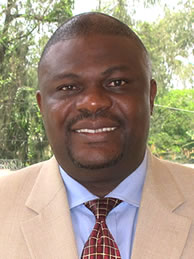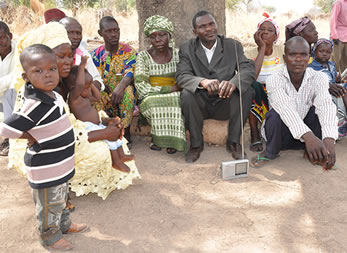AWR News
Stories
“I Tell You, It Was the Best Sabbath”
September 10, 2012 16:15
by Shelley Nolan Freesland
Communication Director
 “I have a miraculous story,” began Dr. Leke Owolabi.
“I have a miraculous story,” began Dr. Leke Owolabi.
Owolabi is the president of the North-Western Nigeria Union Mission. Nigeria is Africa’s most populous country and is composed of more than 250 ethnic groups; Adventists make up little more than 0.001 percent of the population.
The union president had heard reports coming from the tiny village of Lomordu, located far away in Taraba state. Out of the approximately 100 people living in the village, 16 had started listening to AWR’s shortwave programs in the Hausa language. More and more people gradually joined them in tuning in, until 38 were listening regularly.
The people in this area are a mix of traditionalists, Christians, and Muslims. As they listened to the programs, they cross-checked what they were hearing with their copies of the Bible. Convinced, they decided on their own to begin keeping the Sabbath.
Soon they wanted to go in search of this church they had decided to join, so they traveled to Jalingo, the capital city of the state, where they eventually found a Seventh-day Adventist church. Luckily, they arrived at a time when church members were present.
Introducing themselves, the Lormordu villagers said, “Please, are you the ones making the AWR programs? We are with you.”
Owolabi’s brother is a member of the Jalingo church, so he phoned and told the president about the unexpected visitors. Owolabi said to himself, “If this is true, I want to see for myself!” He took the union treasurer with him, and the two men started out on the long journey to Lomordu. Their travel north started on a plane but by the end they had to switch to motorcycles and ride through water in certain places.
Reaching the village eventually, they found that the new group of Sabbath-keepers had constructed a simple church structure – using bamboo and thatch – on a land donated by their leader, a farmer with a lot of property.
Owolabi declared, “I tell you, that was the best church I have ever worshipped in and the best Sabbath I have ever experienced as a church leader! I’m not joking! I was so full of emotion.”
Eighty-five people were present in the church, including the traditional leader of the area. His “kingdom” consists of 20 villages, and Owolabi says, “The door is now open to connect with other people in the region. We want to reach these other 19 villages! As a church, as church leaders, we are working where God is working.”
When Owolabi returned to his office, he shared his elation with the other church leaders. He proposed an amount of money to support the new church, but his treasurer said, “That’s too much!”
Owolabi responded, “If I as the president go out to conduct an evangelistic campaign, and I come back and tell you that 10 souls were baptized in northern Nigeria, you would all clap for me. These are 38 souls that we did not spend a dime on. We WILL vote this money!”
Before long, the leaders were convinced, and they agreed to fund the salary of a pioneer who is now spending the next year working with the people in and around Lomordu; they also contributed some money for building a church with concrete bricks. Furthermore, the union made the bold decision to commit 30 percent of its entire annual evangelism budget to outreach in this area. Plans are in progress for holding a listeners’ convention, likely at the end of this year – after taking into account the dry season, school sessions, and planting and harvesting times.
 “We appreciate tremendously the work AWR is doing in Nigeria,” Owolabi says. “FM radio cannot reach this far out, but with shortwave radio, the gospel can be heard across large distances. Last year, we received a letter with funds from an anonymous donor for purchasing radios in the local market. If we can provide more radios to people, you will be amazed at what will happen in northern Nigeria. We thank God Almighty for His work, and we thank AWR for their work on the ground.”
“We appreciate tremendously the work AWR is doing in Nigeria,” Owolabi says. “FM radio cannot reach this far out, but with shortwave radio, the gospel can be heard across large distances. Last year, we received a letter with funds from an anonymous donor for purchasing radios in the local market. If we can provide more radios to people, you will be amazed at what will happen in northern Nigeria. We thank God Almighty for His work, and we thank AWR for their work on the ground.”
The AWR studio in Nigeria is located at Babcock University, where the staff produces programs in Hausa, Igbo, and Yoruba. The studio director, Femi Kuewumi, says, “You would not believe the response we get. The studio is receiving phone calls from listeners every five minutes, and we get many text messages. The response to our Hausa programs is very, very high. In fact, one report shows that AWR’s programs are receiving the second-highest response in Taraba state. This is miraculous, as northern Nigeria is a Muslim-dominated territory. Our Hausa producer, Ishaya Zachariah, is very dedicated. With him on the team, you can go to bed at night and know that the work will get done. A lot of the initiative in creating the programs comes from him.”
Kuewumi continues, “By traveling to Lomordu to see these radio listeners for himself, Elder Owolabi has gone beyond just acknowledging AWR’s work; he has backed it up with this amazing effort. After what he saw, he now knows the impact AWR is having. Now, he says, he understands how AWR is the advance force, and church workers go in and reap the souls. This has been very encouraging for the radio staff. He is a very special and forceful leader: when he says something will happen, it WILL get done.”
Working in Nigeria is challenging. The power frequently goes out at very critical times during production deadlines. The producers are working with relatively old equipment, judging by AWR’s current standards, and they have insufficient funds to follow up with every listener and send out materials. There has been no equipment technician on the team, so the producers are maintaining the equipment the best they can.
Earlier in the year, the cost of petrol rose sky-high, and this affected every part of daily life. “It was difficult for people to even make a phone call or for volunteers to come to the studio,” Kuewumi says. “You have to ration how much petrol you have and how far it will take you. Plus, there is more insecurity now in the land.”
One of the biggest problems, Kuewumi says, is the local Islamic sect: “It used to be that people could run to churches for refuge during times of crisis. Now the churches are the first places to be hit, and people are scared to go to church on Sunday. But it’s in the midst of this that we have these converts. We need prayers in this regard, because we believe it’s a great opportunity.”
He concludes, “We have had lots of challenges, but we keep surmounting them with God’s grace.”
Ways you can support
Adventist World Radio:











